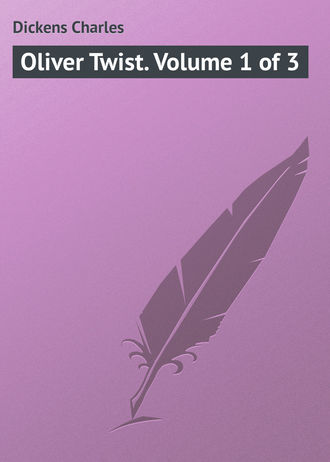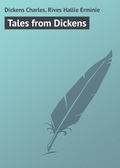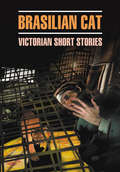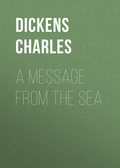
Чарльз Диккенс
Oliver Twist. Volume 1 of 3
CHAPTER VI
OLIVER, BEING GOADED BY THE TAUNTS OF NOAH, ROUSES INTO ACTION, AND RATHER ASTONISHES HIM
The month’s trial over, Oliver was formally apprenticed. It was a nice sickly season just at this time. In commercial phrase, coffins were looking up; and, in the course of a few weeks, Oliver had acquired a great deal of experience. The success of Mr. Sowerberry’s ingenious speculation exceeded even his most sanguine hopes. The oldest inhabitants recollected no period at which measles had been so prevalent, or so fatal to infant existence; and many were the mournful processions which little Oliver headed in a hat-band reaching down to his knees, to the indescribable admiration and emotion of all the mothers in the town. As Oliver accompanied his master in most of his adult expeditions too, in order that he might acquire that unanimity of demeanour and full command of nerve which are so essential to a finished undertaker, he had many opportunities of observing the beautiful resignation and fortitude with which some strong-minded people bear their trials and losses.
For instance, when Sowerberry had an order for the burial of some rich old lady or gentleman, who was surrounded by a great number of nephews and nieces, who had been perfectly inconsolable during the previous illness, and whose grief had been wholly irrepressible even on the most public occasions, they would be as happy among themselves as need be – quite cheerful and contented, conversing together with as much freedom and gaiety as if nothing whatever had happened to disturb them. Husbands, too, bore the loss of their wives with the most heroic calmness; and wives, again, put on weeds for their husbands, as if, so far from grieving in the garb of sorrow, they had made up their minds to render it as becoming and attractive as possible. It was observable, too, that ladies and gentlemen who were in passions of anguish during the ceremony of interment, recovered almost as soon as they reached home, and became quite composed before the tea-drinking was over. All this was very pleasant and improving to see, and Oliver beheld it with great admiration.
That Oliver Twist was moved to resignation by the example of these good people, I cannot, although I am his biographer, undertake to affirm with any degree of confidence; but I can most distinctly say, that for many months he continued meekly to submit to the domination and ill-treatment of Noah Claypole, who used him far worse than ever, now that his jealousy was roused by seeing the new boy promoted to the black stick and hat-band, while he, the old one, remained stationary in the muffin-cap and leathers. Charlotte treated him badly because Noah did; and Mrs. Sowerberry was his decided enemy because Mr. Sowerberry was disposed to be his friend: so, between these three on one side, and a glut of funerals on the other, Oliver was not altogether as comfortable as the hungry pig was, when he was shut up by mistake in the grain department of a brewery.
And now I come to a very important passage in Oliver’s history, for I have to record an act, slight and unimportant perhaps in appearance, but which indirectly produced a most material change in all his future prospects and proceedings.
One day Oliver and Noah had descended into the kitchen, at the usual dinner-hour, to banquet upon a small joint of mutton – a pound and a half of the worst end of the neck; when, Charlotte being called out of the way, there ensued a brief interval of time, which Noah Claypole, being hungry and vicious, considered he could not possibly devote to a worthier purpose than aggravating and tantalising young Oliver Twist.
Intent upon this innocent amusement, Noah put his feet on the table-cloth, and pulled Oliver’s hair, and twitched his ears, and expressed his opinion that he was a “sneak,” and furthermore announced his intention of coming to see him hung whenever that desirable event should take place, and entered upon various other topics of petty annoyance, like a malicious and ill-conditioned charity-boy as he was. But, none of these taunts producing the desired effect of making Oliver cry, Noah attempted to be more facetious still, and in this attempt did what many small wits, with far greater reputations than Noah, notwithstanding, do to this day when they want to be funny; – he got rather personal.
“Work’us,” said Noah, “how’s your mother?”
“She’s dead,” replied Oliver; “don’t you say anything about her to me!”
Oliver’s colour rose as he said this; he breathed quickly, and there was a curious working of the mouth and nostrils, which Mr. Claypole thought must be the immediate precursor of a violent fit of crying. Under this impression, he returned to the charge.
“What did she die of, Work’us?” said Noah.
“Of a broken heart, some of our old nurses told me,” replied Oliver, more as if he were talking to himself than answering Noah. “I think I know what it must be to die of that!”
“Tol de rol lol lol, right fol lairy, Work’us,” said Noah, as a tear rolled down Oliver’s cheek. “What’s set you a-snivelling now?”
“Not you,” replied Oliver, hastily brushing the tear away. “Don’t think it.”
“Oh, not me, eh?” sneered Noah.
“No, not you,” replied Oliver, sharply. “There; that’s enough. Don’t say anything more to me about her; you’d better not!”
“Better not!” exclaimed Noah. “Well! better not! Work’us, don’t be impudent. Your mother, too! She was a nice ’un, she was. Oh, Lor!” And here Noah nodded his head expressively, and curled up as much of his small red nose as muscular action could collect together for the occasion.
“Yer know, Work’us,” continued Noah, emboldened by Oliver’s silence, and speaking in a jeering tone of affected pity – of all tones the most annoying – “Yer know, Work’us, it carn’t be helped now, and of course yer couldn’t help it then, and I’m very sorry for it, and I’m sure we all are, and pity yer very much. But yer must know, Work’us, yer mother was a regular right-down bad ’un.”
“What did you say?” inquired Oliver, looking up very quickly.
“A regular right-down bad ’un, Work’us,” replied Noah, coolly; “and it’s a great deal better, Work’us, that she died when she did, or else she’d have been hard labouring in Bridewell, or transported, or hung, which is more likely than either, isn’t it?”
Crimson with fury, Oliver started up, overthrew chair and table, seized Noah by the throat, shook him in the violence of his rage till his teeth chattered in his head, and, collecting his whole force into one heavy blow, felled him to the ground.
A minute ago the boy had looked the quiet, mild, dejected creature that harsh treatment had made him. But his spirit was roused at last; the cruel insult to his dead mother had set his blood on fire. His breast heaved, his attitude was erect, his eye bright and vivid, and his whole person changed, as he stood glaring over the cowardly tormentor who lay crouching at his feet, and defied him with an energy he had never known before.
“He’ll murder me!” blubbered Noah. “Charlotte! missis! here’s the new boy a-murdering of me! Help! help! Oliver’s gone mad! Char – lotte!”
Noah’s shouts were responded to by a loud scream from Charlotte, and a louder from Mrs. Sowerberry; the former of whom rushed into the kitchen by a side-door, while the latter paused on the staircase till she was quite certain that it was consistent with the preservation of human life to come further down.
“Oh, you little wretch!” screamed Charlotte, seizing Oliver with her utmost force, which was about equal to that of a moderately strong man in particularly good training, – “Oh, you little un-grate-ful, mur-de-rous, hor-rid vil-lain!” and between every syllable Charlotte gave Oliver a blow with all her might, and accompanied it with a scream for the benefit of society.
Charlotte’s fist was by no means a light one; but, lest it should not be effectual in calming Oliver’s wrath, Mrs. Sowerberry plunged into the kitchen, and assisted to hold him with one hand, while she scratched his face with the other; in this favourable position of affairs Noah rose from the ground, and pummeled him from behind.
This was rather too violent exercise to last long. When they were all three wearied out, and could tear and beat no longer, they dragged Oliver, struggling and shouting, but nothing daunted, into the dust-cellar, and there locked him up; this being done, Mrs. Sowerberry sunk into a chair, and burst into tears.
“Bless her, she’s going off!” said Charlotte. “A glass of water, Noah, dear. Make haste.”
“Oh! Charlotte,” said Mrs. Sowerberry, speaking as well as she could through a deficiency of breath and a sufficiency of cold water which Noah had poured over her head and shoulders, – “Oh! Charlotte, what a mercy we have not been all murdered in our beds!”
“Ah! mercy indeed, ma’am,” was the reply. “I only hope this’ll teach master not to have any more of these dreadful creatures that are born to be murderers and robbers from their very cradle. Poor Noah! he was all but killed, ma’am, when I came in.”
“Poor fellow!” said Mrs. Sowerberry, looking piteously on the charity-boy.
Noah, whose top waistcoat-button might have been somewhere on a level with the crown of Oliver’s head, rubbed his eyes with the inside of his wrists while this commiseration was bestowed upon him, and performed some affecting tears and sniffs.
“What’s to be done!” exclaimed Mrs. Sowerberry. “Your master’s not at home, – there’s not a man in the house, – and he’ll kick that door down in ten minutes.” Oliver’s vigorous plunges against the bit of timber in question rendered this occurrence highly probable.
“Dear, dear! I don’t know, ma’am,” said Charlotte, “unless we send for the police-officers.”
“Or the millingtary,” suggested Mr. Claypole.
“No, no,” said Mrs. Sowerberry, bethinking herself of Oliver’s old friend; “run to Mr. Bumble, Noah, and tell him to come here directly, and not to lose a minute; never mind your cap – make haste. You can hold a knife to that black eye as you run along, and it’ll keep the swelling down.”
Noah stopped to make no reply, but started off at his fullest speed; and very much it astonished the people who were out walking, to see a charity-boy tearing through the streets pell-mell, with no cap on his head, and a clasp-knife at his eye.
CHAPTER VII
OLIVER CONTINUES REFRACTORY
Noah Claypole ran along the streets at his swiftest pace, and paused not once for breath until he reached the workhouse-gate. Having rested here for a minute or so, to collect a good burst of sobs and an imposing show of tears and terror, he knocked loudly at the wicket, and presented such a rueful face to the aged pauper who opened it, that even he, who saw nothing but rueful faces about him at the best of times, started back in astonishment.
“Why, what’s the matter with the boy?” said the old pauper.
“Mr. Bumble! Mr. Bumble!” cried Noah, with well-affected dismay, and in tones so loud and agitated that they not only caught the ear of Mr. Bumble himself, who happened to be hard by, but alarmed him so much that he rushed into the yard without his cocked hat, – which is a very curious and remarkable circumstance, as showing that even a beadle, acted upon by a sudden and powerful impulse, may be afflicted with a momentary visitation of loss of self-possession, and forgetfulness of personal dignity.
“Oh, Mr. Bumble, sir!” said Noah: “Oliver, sir, – Oliver has – ”
“What? – what?” interposed Mr. Bumble, with a gleam of pleasure in his metallic eyes. “Not run away; he hasn’t run away, has he, Noah?”
“No, sir, no; not run away, sir, but he’s turned wicious,” replied Noah. “He tried to murder me, sir, and then he tried to murder Charlotte, and then missis. Oh! what dreadful pain it is! such agony, please, sir!” and here Noah writhed and twisted his body into an extensive variety of eel-like positions; thereby giving Mr. Bumble to understand that, from the violent and sanguinary onset of Oliver Twist, he had sustained severe internal injury and damage, from which he was at that moment suffering the acutest torture.
When Noah saw that the intelligence he communicated perfectly paralyzed Mr. Bumble, he imparted additional effect thereunto, by bewailing his dreadful wounds ten times louder than before; and, when he observed a gentleman in a white waistcoat crossing the yard, he was more tragic in his lamentations than ever, rightly conceiving it highly expedient to attract the notice, and rouse the indignation, of the gentleman aforesaid.
The gentleman’s notice was very soon attracted, for he had not walked three paces when he turned angrily round, and inquired what that young cur was howling for, and why Mr. Bumble did not favour him with something which would render the series of vocular exclamations so designated, an involuntary process.
“It’s a poor boy from the free-school, sir,” replied Mr. Bumble, “who has been nearly murdered – all but murdered, sir – by young Twist.”
“By Jove!” exclaimed the gentleman in the white waistcoat, stopping short. “I knew it! I felt a strange presentiment from the very first, that that audacious young savage would come to be hung!”
“He has likewise attempted, sir, to murder the female servant,” said Mr. Bumble, with a face of ashy paleness.
“And his missis,” interposed Mr. Claypole.
“And his master, too, I think you said, Noah?” added Mr. Bumble.
“No; he’s out, or he would have murdered him,” replied Noah. “He said he wanted to – ”
“Ah! said he wanted to – did he, my boy?” inquired the gentleman in the white waistcoat.
“Yes, sir,” replied Noah; “and please, sir, missis wants to know whether Mr. Bumble can spare time to step up there directly and flog him, ’cause master’s out.”
“Certainly, my boy; certainly,” said the gentleman in the white waistcoat, smiling benignly, and patting Noah’s head, which was about three inches higher than his own. “You’re a good boy – a very good boy. Here’s a penny for you. Bumble, just step up to Sowerberry’s with your cane, and see what’s best to be done. Don’t spare him, Bumble.”
“No, I will not sir,” replied the beadle, adjusting the wax-end which was twisted round the bottom of his cane for purposes of parochial flagellation.
“Tell Sowerberry not to spare him either. They’ll never do anything with him without stripes and bruises,” said the gentleman in the white waistcoat.
“I’ll take care, sir,” replied the beadle. And the cocked hat and cane having been by this time adjusted to their owner’s satisfaction, Mr. Bumble and Noah Claypole betook themselves with all speed to the undertaker’s shop.
Here the position of affairs had not at all improved, or Sowerberry had not yet returned, and Oliver continued to kick with undiminished vigour at the cellar-door. The accounts of his ferocity, as related by Mrs. Sowerberry and Charlotte, were of so startling a nature that Mr. Bumble judged it prudent to parley before opening the door. With this view he gave a kick at the outside, by way of prelude, and then, applying his mouth to the keyhole, said, in a deep and impressive tone,
“Oliver!”
“Come; you let me out!” replied Oliver, from the inside.
“Do you know this here voice, Oliver?” said Mr. Bumble.
“Yes,” replied Oliver.
“Ain’t you afraid of it, sir? Ain’t you a-tremling while I speak, sir?” said Mr. Bumble.
“No!” replied Oliver boldly.
An answer so different from the one he had expected to elicit, and was in the habit of receiving, staggered Mr. Bumble not a little. He stepped back from the keyhole, drew himself up to his full height, and looked from one to another of the three by-standers in mute astonishment.
“Oh, you know Mr. Bumble, he must be mad,” said Mrs. Sowerberry. “No boy in half his senses could venture to speak so to you.”
“It’s not madness, ma’am,” replied Mr. Bumble, after a few moments of deep meditation; “it’s meat.”
“What!” exclaimed Mrs. Sowerberry.
“Meat, ma’am, meat,” replied Bumble, with stern emphasis. “You’ve overfed him, ma’am. You’ve raised a artificial soul and spirit in him, ma’am, unbecoming a person of his condition, as the board, Mrs. Sowerberry, who are practical philosophers, will tell you. What have paupers to do with soul or spirit either? It’s quite enough that we let ’em have live bodies. If you had kept the boy on gruel, ma’am, this would never have happened.”
“Dear, dear!” ejaculated Mrs. Sowerberry, piously raising her eyes to the kitchen ceiling, “this comes of being liberal!”
The liberality of Mrs. Sowerberry to Oliver had consisted in a profuse bestowal upon him of all the dirty odds and ends which nobody else would eat; so that there was a great deal of meekness and self-devotion in her voluntarily remaining under Mr. Bumble’s heavy accusation, of which, to do her justice, she was wholly innocent in thought, word, or deed.
“Ah!” said Mr. Bumble, when the lady brought her eyes down to earth again; “the only thing that can be done now, that I know of, is to leave him in the cellar for a day or so till he’s a little starved down, and then to take him out and keep him on gruel all through his apprenticeship. He comes of a bad family – excitable natures, Mrs. Sowerberry. Both the nurse and doctor said that that mother of his made her way here against difficulties and pain that would have killed any well-disposed woman weeks before.”
At this point of Mr. Bumble’s discourse, Oliver just hearing enough to know that some further allusion was being made to his mother, recommenced kicking with a violence which rendered every other sound inaudible. Sowerberry returned at this juncture, and Oliver’s offence having been explained to him, with such exaggerations as the ladies thought best calculated to rouse his ire, he unlocked the cellar-door in a twinkling, and dragged his rebellious apprentice out by the collar.
Oliver’s clothes had been torn in the beating he had received; his face was bruised and scratched, and his hair scattered over his forehead. The angry flush had not disappeared, however; and when he was pulled out of his prison, he scowled boldly on Noah, and looked quite undismayed.
“Now, you are a nice young fellow, ain’t you?” said Sowerberry, giving Oliver a shake and a box on the ear.
“He called my mother names,” replied Oliver.
“Well, and what if he did, you little ungrateful wretch?” said Mrs. Sowerberry. “She deserved what he said, and worse.”
“She didn’t,” said Oliver.
“She did,” said Mrs. Sowerberry.
“It’s a lie!” said Oliver.
Mrs. Sowerberry burst into a flood of tears.
This flood of tears left Sowerberry no alternative. If he had hesitated for one instant to punish Oliver most severely, it must be quite clear to every experienced reader that he would have been, according to all precedents in disputes of matrimony established, a brute, an unnatural husband, an insulting creature, a base imitation of a man, and various other agreeable characters too numerous for recital within the limits of this chapter. To do him justice, he was, as far as his power went, – it was not very extensive, – kindly disposed towards the boy; perhaps because it was his interest to be so, perhaps because his wife disliked him. The flood of tears, however, left him no resource; so he at once gave him a drubbing, which satisfied even Mrs. Sowerberry herself, and rendered Mr. Bumble’s subsequent application of the parochial cane rather unnecessary. For the rest of the day he was shut up in the back kitchen, in company with a pump and a slice of bread; and, at night, Mrs. Sowerberry, after making various remarks outside the door, by no means complimentary to the memory of his mother, looked into the room, and, amidst the jeers and pointings of Noah and Charlotte, ordered him up stairs to his dismal bed.
It was not until he was left alone in the silence and stillness of the gloomy workshop of the undertaker, that Oliver gave way to the feelings which the day’s treatment may be supposed likely to have awakened in a mere child. He had listened to their taunts with a look of contempt; he had borne the lash without a cry, for he felt that pride swelling in his heart which would have kept down a shriek to the last, if they had roasted him alive. But, now, that there were none to see or hear him, he fell upon his knees on the floor, and, hiding his face in his hands, wept such tears as, God send for the credit of our nature, few so young may ever have cause to pour out before him.
For a long time Oliver remained motionless in this attitude. The candle was burning low in the socket when he rose to his feet, and having gazed cautiously round him, and listened intently, gently undid the fastenings of the door and looked abroad.
It was a cold dark night. The stars seemed to the boy’s eyes further from the earth than he had ever seen them before; there was no wind; and the sombre shadows thrown by the trees on the earth, looked sepulchral and death-like, from being so still. He softly reclosed the door, and, having availed himself of the expiring light of the candle to tie up in a handkerchief the few articles of wearing apparel he had, sat himself down upon a bench to wait for morning.
With the first ray of light that struggled through the crevices in the shutters Oliver rose, and again unbarred the door. One timid look around, – one moment’s pause of hesitation, – he had closed it behind him, and was in the open street.
He looked to the right and to the left, uncertain whither to fly. He remembered to have seen the waggons, as they went out, toiling up the hill; he took the same route, and arriving at a footpath across the fields, which he knew after some distance led out again into the road, struck into it, and walked quickly on.
Along this same footpath Oliver well remembered he had trotted beside Mr. Bumble, when he first carried him to the workhouse from the farm. His way lay directly in front of the cottage. His heart beat quickly when he bethought himself of this, and he half resolved to turn back. He had come a long way though, and should lose a great deal of time by doing so. Besides, it was so early that there was very little fear of his being seen; so he walked on.
He reached the house. There was no appearance of its inmates stirring at that early hour. Oliver stopped, and peeped into the garden. A child was weeding one of the little beds; and as he stopped, he raised his pale face, and disclosed the features of one of his former companions. Oliver felt glad to see him before he went, for, though younger than himself, he had been his little friend and playmate; they had been beaten, and starved, and shut up together, many and many a time.
“Hush, Dick!” said Oliver, as the boy ran to the gate, and thrust his thin arm between the rails to greet him. “Is any one up?”
“Nobody but me,” replied the child.
“You mustn’t say you saw me, Dick,” said Oliver; “I am running away. They beat and ill-use me, Dick; and I am going to seek my fortune, some long way off, I don’t know where. How pale you are!”
“I heard the doctor tell them I was dying,” replied the child with a faint smile. “I am very glad to see you, dear; but don’t stop, don’t stop.”
“Yes, yes, I will, to say good-b’ye to you,” replied Oliver. “I shall see you again, Dick; I know I shall. You will be well and happy.”
“I hope so,” replied the child, “after I am dead, but not before. I know the doctor must be right, Oliver, because I dream so much of heaven and angels, and kind faces that I never see when I am awake. Kiss me,” said the child, climbing up the low gate, and flinging his little arms round Oliver’s neck. “Good-b’ye, dear! God bless you!”
The blessing was from a young child’s lips, but it was the first that Oliver had ever heard invoked upon his head; and through all the struggles and sufferings, and troubles and changes of his after life, he never once forgot it.






